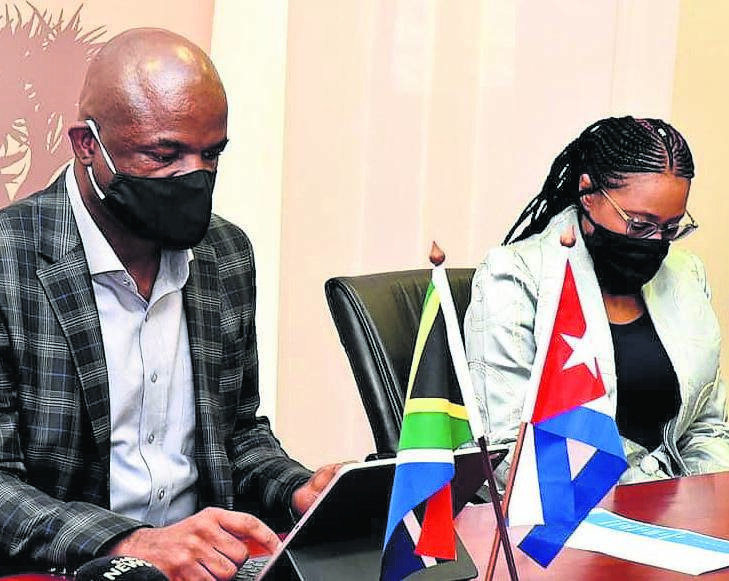


Northern Cape Premier Zamani Saul with Health MEC Mase Manopole in May.
Facebook, Northern Cape Department of Health
- The Northern Cape could experience its Covid-19 peak at the end of August, or beginning of September, according to Premier Zamani Saul.
- He said this was inevitable after the easing of the nationwide lockdown but added he was happy with the current low level of transmission in the province.
- Both the Department of Health and the Department of Education also gave an update on how Covid-19 has impacted the province.
Northern Cape Premier Zamani Saul has said the province could hit its Covid-19 peak at the end of August, or beginning of September.
Saul was speaking at a briefing in Kimberley on Wednesday where he gave an update on the Covid-19 situation in the province.
He said he was happy with the low levels of transmission, with 888 positive cases, six deaths and 237 recoveries. The province has the lowest Covid-19 impact in the country.
However, he added that with the easing of lockdown levels a rise in cases was inevitable, and projections suggested this might happen in August, going into September.
READ | Science and innovation dept to research traditional medicine for Covid-19 fight
As a result, the province had increased its screening and testing capacity.
Saul said there was a general concern that the low figures meant the province was not conducting enough tests.
“We have the figures of people we have tested which we think, as a province, is quite fair but there is absolutely no way that the provincial government can embark on any form of malice to hide figures of people who have been exposed to Covid-19 because that’s not going to help [fight] the virus,” Saul said.
Budget
In anticipation of a rise in cases, Saul said the provincial government had reprioritised the budget – called the “Covid Budget” – to strengthen capacity in the provincial Department of Health and the provincial Department of Education.
“In total, we allocated the two departments about R502 million. For the Department of Health, we reallocated about R396 million and for the Department of Education R206 million,” he explained.
This was to ensure that when schools open, “children are not unnecessarily exposed to Covid-19” and the health department is able to respond to the virus.
Covid-19 breakdown
Acting head of the Department of Health Dion Theys presented a breakdown of Covid-19 cases in the province.
Currently, the Frances Baard district has recorded 274 positive cases, 65 recoveries and three deaths.
The JT Gaetsewe district has 83 positive cases, nine recoveries and one death.
Namakwa has 28 positive cases, seven recoveries and no deaths.
The Pixley Ka Seme district has 320 positive cases, 79 recoveries and one death.
The ZF Mgcawu district has 107 positive cases, 77 recoveries and one death.
The mean age that has experienced the brunt of Covid-19 infections in the province is 30 to 60 – a deviation from the national trend of 60 and older.
Theys said 14 nurses, eight community health workers and five doctors have been infected with Covid-19 in the province.
ALSO READ | Covid-19 temporarily paralyses Northern Cape doctor, a very rare symptom globally
Education breakdown
Head of the Department of Education Tshepo Pharasi said since schools reopened on 8 June, 54 schools in the province did not open owing to issues of personal protective equipment and water access.
He said their most challenging area was managing staff and teachers with underlying health conditions.
A total of 25 schools have so far been affected by the virus, with nine having to close, Pharasi said.
He added that 23 teachers and 13 pupils have been infected with Covid-19.
Pharasi said they were working with the health department, and assured parents that schools were safe and healthy environments.
LIVE | All the latest coronavirus and lockdown updates
Stay healthy and entertained during the national lockdown. Sign up for our Lockdown Living newsletter. Sign up and manage your newsletters in the new News24 app by clicking on the Profile tab

